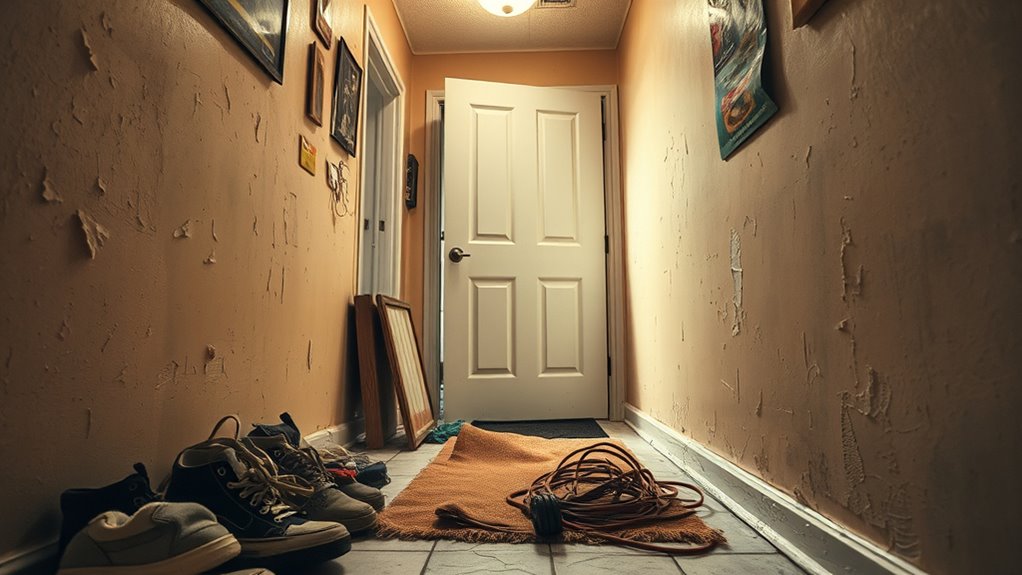If you plan to rent long-term, be aware of hidden costs beyond your regular rent. These include lease renewal fees, rent increases, renter’s insurance, utility bills, and unexpected maintenance expenses. Accessories like appliances or entertainment tech can also add up. Staying on top of these costs helps you avoid surprises and manage your budget better. Keep exploring to uncover more hidden expenses that could affect your renting journey.
Key Takeaways
- Lease renewals may increase rent and fees, escalating long-term costs without proper planning.
- Renter insurance is a recurring expense that protects belongings and liability, often required by landlords.
- Hidden maintenance and utility costs, like minor repairs and bills, add up over time and impact your budget.
- Additional living expenses such as kitchen supplies, entertainment, and parking fees often go unnoticed.
- Proactive planning for all recurring expenses ensures long-term affordability and prevents unexpected financial burdens.

Renting a home involves more than just paying the monthly rent; there are several costs that can add up quickly. One of the most overlooked expenses is the lease renewal process. When your lease is coming up for renewal, you might find yourself facing increased rent prices or additional fees. Landlords often raise rates to keep up with market changes, and renewing your lease might mean negotiating a new agreement or paying a renewal fee. If you’re someone who prefers stability, you might choose to renew your lease repeatedly, but don’t forget that each renewal can come with its own costs, and those costs can escalate over time. It’s wise to budget for potential rent increases and to stay aware of your lease’s renewal terms so you’re not caught off guard when the time comes.
Renewing your lease can lead to rising costs and fees; plan ahead to avoid unexpected expenses.
Another essential expense that renters often overlook is renter insurance. While it might seem like an unnecessary extra, renter insurance is vital for protecting your personal belongings from theft, fire, or other damages. It’s a relatively small monthly expense compared to the potential cost of replacing everything you own in a disaster. Landlords might even require you to have renter insurance before signing your lease or renewing it, so it’s a good idea to factor this into your ongoing rental costs. Failing to budget for renter insurance can leave you vulnerable financially if something unexpected happens. Plus, some policies also offer liability coverage, protecting you if someone gets injured in your apartment and decides to sue.
Beyond lease renewal and renter insurance, there are other hidden costs that can sneak up on you. Maintenance fees, for example, might be covered by your landlord, but sometimes you’re responsible for minor repairs or replacements, like lightbulbs or appliance fix-ups. Additionally, utilities such as water, electricity, gas, and internet often aren’t included in your rent, so you need to account for these monthly bills. Parking fees, pet deposits, and late payment charges also add to your overall expense of renting. Being aware of the cost of tableware and how it can impact your budget in a rental setting highlights the importance of planning for all expenses, including those related to your living environment. Incorporating cooking expenses into your financial planning can help you manage your overall budget more effectively. Furthermore, understanding the role of projectors and their associated costs in home entertainment setups can help you allocate funds wisely for your living space. All these expenses can quickly add up if you’re not careful. The key is to plan ahead and keep track of your ongoing rental costs beyond just the rent payment. Understanding these hidden costs will help you avoid surprises and make sure you’re financially prepared to stay in your home comfortably for the long term. Additionally, considering the benefits of self watering plant pots can help reduce the need for frequent plant care, saving you both time and money on plant maintenance.
Frequently Asked Questions
Are There Tax Benefits to Renting Long-Term?
When considering long-term renting, you might wonder about tax benefits. While renters generally can’t claim mortgage interest or property tax deductions, some government incentives and tax deductions could help reduce your taxable income, like renter’s credits or energy-efficient upgrades. These benefits vary by location. You should explore local regulations, but overall, renting offers fewer tax advantages compared to homeowners, so it’s essential to weigh these factors in your financial planning.
How Do Rent Increases Typically Occur Over Time?
Like waves gradually rising on the shoreline, rent increases often grow over time. Typically, rent escalation is outlined in your lease renewal agreement, which specifies how much your rent can increase annually. Landlords may cap increases or tie them to inflation rates. Understanding your lease terms helps you anticipate these changes, so you’re not caught off guard when your landlord proposes a rent escalation during renewal negotiations.
What Hidden Fees Might Landlords Charge?
Landlords may charge hidden fees that catch you off guard, like extra security deposits or unexpected maintenance fees. These costs aren’t always clear upfront and can add considerably to your expenses. Always ask about security deposits and maintenance fees before signing a lease. Being aware of these potential charges helps you avoid surprises and better understand the true cost of renting, saving you money and stress in the long run.
How Does Renter’s Insurance Impact Overall Costs?
Did you know that nearly 97% of renters believe insurance is unnecessary? Renter’s insurance impacts your overall costs through policy premiums, which can vary based on coverage level. Liability coverage is essential, protecting you from damages or injuries you might be responsible for. While it adds to your monthly expenses, it’s a small price to pay for peace of mind and financial protection against unexpected events.
Can Renting Affect My Credit Score?
Renting can affect your credit impact because your rental payments influence your credit score through scoring factors like payment history. If you pay on time, it can boost your score; missed payments, however, can harm it. Landlords may report your rent to credit bureaus, so consistent, timely payments help improve your credit profile. Keep track of your rental history to guarantee it positively contributes to your overall credit scoring factors.
Conclusion
Don’t disregard the dollars draining your dollars. Renting might seem simple, but hidden costs can silently sabotage your savings. By budgeting for insurance, maintenance, and missed opportunities, you protect your pocket and peace of mind. Remember, being aware of these costs isn’t a burden — it’s a bold step toward building a brighter financial future. So, stay savvy, scrutinize spending, and steer your savings toward something truly significant. Your smarter, stronger financial future starts today.










